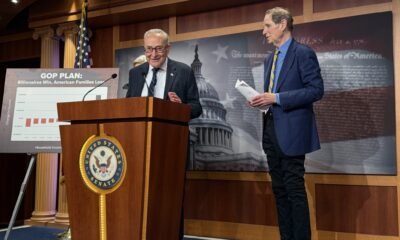Business
U.S. House Panel Approves Controversial GOP Plan Slashing $625B from Medicaid and Enforcing Work Requirements

The U.S. House committee responsible for restructuring Medicaid concluded a 25-hour debate on its proposed bill on Wednesday. The Energy and Commerce Committee voted 30-24 along party lines to advance the legislation, moving it to the Budget panel for incorporation into a comprehensive Republican package expected to be finalized on Friday.
The full House plans to vote on this legislative package next week, although GOP leaders must ensure nearly unanimous support from their 220 members for it to pass. If approved, the bill will head to the Senate, where significant revisions are anticipated.
The Congressional Budget Office’s recent analysis reveals that the Medicaid modifications could result in a $625 billion reduction in federal spending over the next decade. Approximately 10.3 million individuals may find themselves without access to Medicaid or the Children’s Health Insurance Program, with an estimated 7.6 million expected to become uninsured during this budget period.
Debate primarily focused on partisan concerns, with Democrats warning that the bill would severely impact vulnerable populations’ access to healthcare. In contrast, Republicans asserted that their plan would uphold the integrity of the healthcare program for lower-income individuals and those with disabilities.
Democrats attempted to introduce numerous amendments to mitigate the bill’s effects, particularly regarding Medicaid provisions, but their efforts were largely blocked.
Ohio Democratic Rep. Greg Landsman criticized Republican assertions that no one would lose Medicaid due to budget cuts, emphasizing that bureaucratic hurdles would result in vulnerable individuals losing coverage. He argued that those affected are deserving citizens who rely on Medicaid for essential care.
Further concerns were voiced by Washington Democratic Sen. Kim Schrier, who predicted that individuals dropping off Medicaid would delay seeking routine healthcare, leading to more severe, costly emergency treatments. “The care will be more complicated and more expensive,” Schrier cautioned, suggesting that increased emergency room visits would elevate insurance rates for everyone.
Florida Rep. Laurel Lee defended the GOP’s approach, describing the amendments as common-sense changes designed to protect the program’s integrity while emphasizing the need for work requirements and fraud prevention.
During the discussions, amendments aimed at scrapping work requirements were presented by Democrats. New Jersey Democratic Rep. Frank Pallone pointed to issues in states like Georgia, where stringent requirements resulted in many eligible individuals losing Medicaid access due to complex paperwork. He stated the barriers were preventing eligible constituents from proving their status.
Energy and Commerce Committee Chairman Brett Guthrie acknowledged the problematic implementation in Arkansas and Georgia but insisted that the current GOP proposal would simplify verification for beneficiaries. This legislation requires proof of work at enrollment or during eligibility redetermination, aiming to ease the application process.
Other controversial provisions emerged during the debate, including an amendment aimed at shielding Planned Parenthood from Medicaid funding. Texas Democratic Rep. Lizzie Fletcher argued that this would severely restrict access to essential health services. The provision is projected to increase federal deficits by approximately $300 million over the next decade.
Republicans cited a need to reassess funding for other organizations linked to family planning services but provided little clarity on which entities would be affected. The move, critics argue, hampers access to preventive care and health check-ups for many low-income individuals.
As discussions continue, the GOP’s focus remains on streamlining Medicaid. Nonetheless, potential repercussions regarding the loss of coverage for millions raise substantial concerns among critics.


















